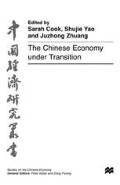Abstract
The aim of this chapter is to make some selective comparisons of the empirical evidence relating to financial discipline and soft budget constraints1 in the enterprise sector in China and the transition countries of Central and Eastern Europe and the former Soviet Union (CEEFSU). We divide the evidence into four categories: budgetary subsidies, trade credit, the banking system and tax arrears. The reasons for this division include the following.
Access this chapter
Tax calculation will be finalised at checkout
Purchases are for personal use only
Preview
Unable to display preview. Download preview PDF.
Bibliography
Alfandari, G. and M. E. Schaffer (1996) ‘“Arrears” in the Enterprise Sector’, in S. Commander, Q. Fan and M. E. Schaffer (eds), Enterprise Restructuring and Economic Policy in Russia (New York: EDI/World Bank).
Belka, M., S. Estrin, M. E. Schaffer and I. J. Singh (1995) ‘Enterprise Adjustment in Poland: evidence from a Survey of 200 Private, Privatized, and State-owned Firms’, Centre for Economic Performance Discussion Paper, 233, April.
Bonin, J. P. and M. E. Schaffer (1995) ‘Banks, Firms, Bad Debts and Bankruptcy in Hungary 1991–94’, Centre for Economic Performance Discussion Paper, 234, April.
Bouin, O. (1996) ‘Financial Discipline and State Enterprise Reform in China in the 1990s’, in O. Bouin, F. Coricelli and F. Lemoine (eds), Different Paths to a Market Economy: China and European Economies in Transition (London and Paris: CEPR/CEPII/OECD).
Broadman, H. G. (1994) ‘Meeting the Challenge of Chinese Enterprise Reform’, World Bank Discussion Papers, 283(Washington, DC: The World Bank).
Coricelli, F., M. D’browski and U. Kosterna (1997) Fiscal Policy in Transition, EPI Forum Report 3 (London and New York: CEPR and IEWS).
Cornelli, F., R. Portes and M. E. Schaffer (1996) ‘The Capital Structure of Firms in Central and Eastern Europe’, in O. Bouin, F. Coricelli and F. Lemoine (eds), Different Paths to a Market Economy: China and European Economies in Transition (London and Paris: CEPR/CEPII/OECD).
Fan, Gang (1996) ‘Interenterprise Debts and Macroeconomic Performance in China’, Institute of Economics, China Academy of Social Sciences.
Fan, Qimiao, Lei Li and Zhaopin Peng (1989) ‘The CESRRI Enterprise Panel Survey System: An Introduction’, STICERD China Programme Technical Reports, 1, December.
Kornai, J. (1986) ‘The Soft Budget Constraint’, Kyklos, 39(1).
Lo, D. (1997) ‘Re-appraising China’s State-Owned Industrial Enterprises’, SOAS Department of Working Paper Series 67, University of London, April.
Perotti, E. (1997) ‘Inertial Credit and Opportunistic Arrears in Transition’, European Economic Review, forthcoming.
Rajan, R. and L. Zingales (1995) ‘What Do We Know About Capital Structure? Some Evidence from International Data’, Journal of Finance, 50 (5), December.
Schaffer, M. E. (1995) ‘Government Subsidies to Enterprises in Central and Eastern Europe: Budgetary Subsidies and Tax Arrears’, In D. M. G. Newbery (ed.), Tax and Benefit Reform in Central and Eastern Europe (London: Centre for Economic Policy Research), pp. 115–144.
Schaffer, M. E. (1996) ‘Tax Arrears in Transition Economies’, CERT, Heriot-Watt University, mimeo.
Schaffer, M. E. (1998), ‘Do Firms in Transition Countries Have Soft Budget Constraints? A Reconsideration of Concepts and Evidence’, Journal of Comparative Economics, March.
Woo, Wing Thye (1996) ‘Financial Intermediation in China’, in O. Bouin, F. Coricelli and F. Lemoine (eds.), Different Paths to a Market Economy: China and European Economies in Transition, (London and Paris: CEPR/CEPII/OECD).
World Bank (1995) China: Macroeconomic Stability in a Decentralized Economy. (Washington, DC: The World Bank).
World Bank (1997) China’s Management of Enterprise Assets: The State as Shareholder (Washington, DC: The World Bank).
Zou, Liang and Laixiang Sun (1996), ‘Interest Rate Policy and Incentives of State-Owned Enterprises in the Transitional China’. Journal of Comparative Economics, Vol. 23, No. 3, pp. 292–318.
Editor information
Editors and Affiliations
Copyright information
© 2000 Palgrave Macmillan, a division of Macmillan Publishers Limited
About this chapter
Cite this chapter
Gao, S., Schaffer, M.E. (2000). Financial Discipline in the Enterprise Sector in Transition Countries: How Does China Compare?. In: Cook, S., Yao, S., Zhuang, J. (eds) The Chinese Economy under Transition. Studies on the Chinese Economy. Palgrave Macmillan, London. https://doi.org/10.1057/9780230288164_4
Download citation
DOI: https://doi.org/10.1057/9780230288164_4
Publisher Name: Palgrave Macmillan, London
Print ISBN: 978-1-349-27852-7
Online ISBN: 978-0-230-28816-4
eBook Packages: Palgrave Economics & Finance CollectionEconomics and Finance (R0)

